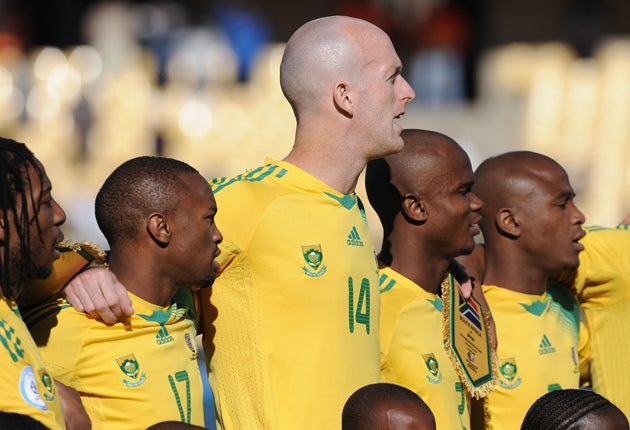When South Africa face Mexico in the opening match of the 2010 World Cup on Friday, Soccer City will be packed with supporters from across the Rainbow Nation's racial divides.
Out on the pitch, however, it will be a different story. After goalkeeper Rowen Fernandez was surprisingly left out, the Bafana Bafana squad contains just one white player, defender Matthew Booth, and no players of Indian extraction.
With Booth not expected to make the starting line-up, the likelihood is the host country will be represented by 11 players from families who were all denied the right to vote until the end of apartheid. That is a far cry from the country's most successful footballing achievement back in 1996, just two years after Nelson Mandela was elected President. The meeting with Tunisia in the African Nations' Cup final saw three white players (captain Neil Tovey, Mark Fish and Eric Tinkler) start the game, with a further three on the bench as South Africa went on to record a 2-0 victory.
That team was coached by Clive Barker, an early pioneer of non-racial football, and he believes the decline of white players in South Africa has much to do with the collapse of apartheid. "In the old days, the amateur game was the nursery for our rising players and that's why so many came through. That's dropped away steadily as part of the overall demise in standards throughout the country, which means the national team have far less players to pick from," he said.
With his towering height and bald head, Booth emerged as a cult hero at last year's Confederations Cup. That was also largely due to his status as the team's only white player and despite having dropped down the pecking order since then, he admitted that he feels a duty to change the commonly held theory that football is "the black man's game" in South Africa. "A lot of foreign media have taken up this issue with me and I've tried to change that perception," said Booth. "If you scratch the surface, one of the best teams in the country, Mamelodi Sundowns, have four white players in the squad while AmaZulu have five or six.
"It is probably a bit disproportionate in terms of our overall population but white kids are still generally attracted to rugby and cricket because they are perceived to be more successful, and at amateur levels they are much better organised. Hardly any schools now offer their kids the chance to play football, which is a great pity, and I think the standard has dropped considerably because of a lack of proper structure at youth levels."
Now director of football at AmaZulu, Barker has high hopes that the arrival of the World Cup will change that forever. He is a firm believer that South Africa's racial diversity should be used to their advantage in the future and partly attributes Bafana Bafana's slip down the Fifa rankings in recent years to the lack of white players who have risen to the top.
"You don't want to make an issue out of something like that but the statistics show that has happened in South African football," he said. "AmaZulu fans have a saying: you can never win anything if you don't mix it. We definitely need to find ways to bring white kids back into the game."
For Booth, it is more of an indictment on general standards in football development. "It's a coincidence; there have been a number of white players knocking on the door. We can't expect the team to be racially representative all the time and I'm glad it has not gone the way of cricket and rugby with quotas. Football has never needed a quota system and never will."
Subscribe to Independent Premium to bookmark this article
Want to bookmark your favourite articles and stories to read or reference later? Start your Independent Premium subscription today.


Join our commenting forum
Join thought-provoking conversations, follow other Independent readers and see their replies